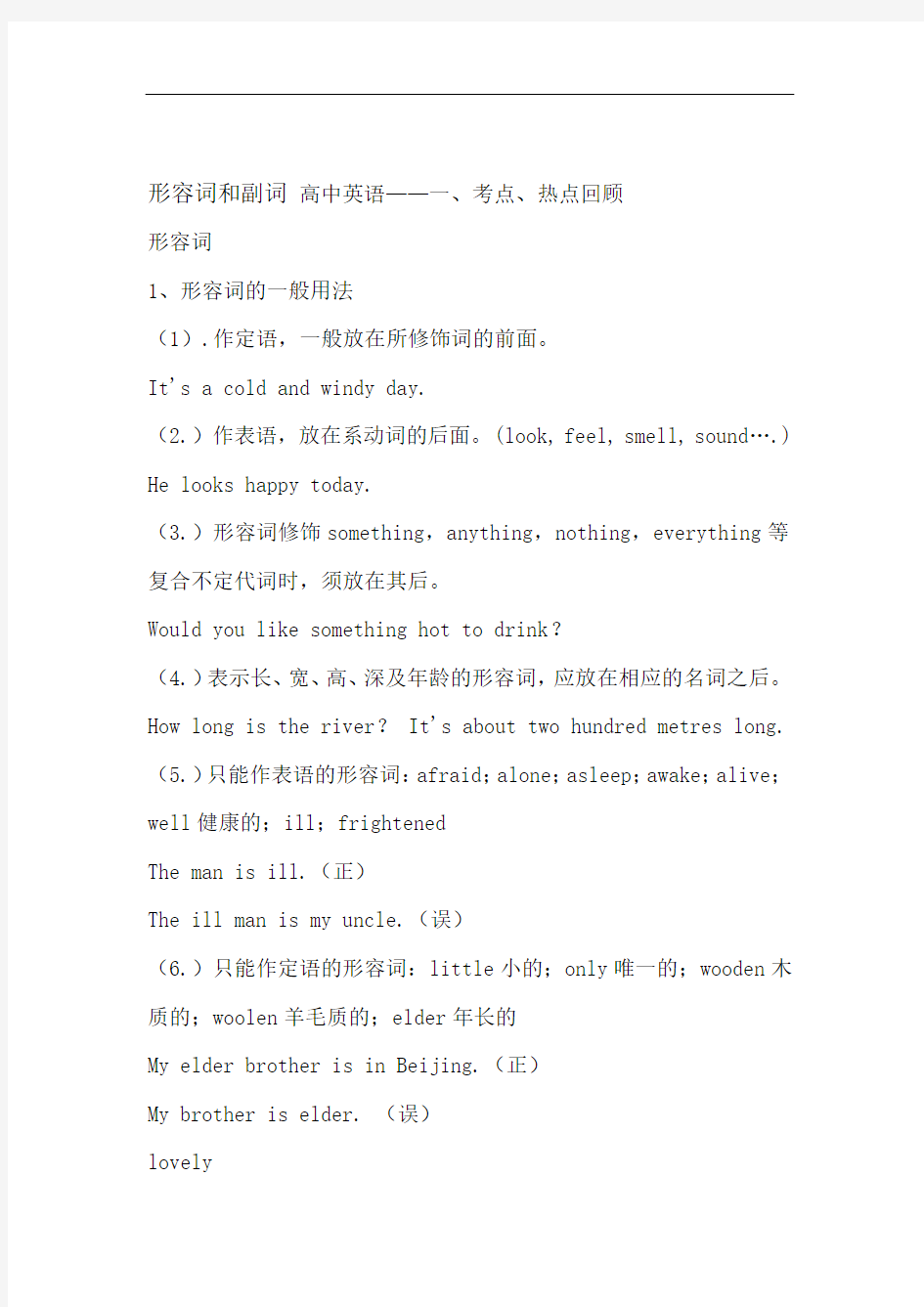形容词和副词讲解和习题练习含答案


形容词和副词高中英语——一、考点、热点回顾
形容词
1、形容词的一般用法
(1).作定语,一般放在所修饰词的前面。
It's a cold and windy day.
(2.)作表语,放在系动词的后面。(look, feel, smell, sound….) He looks happy today.
(3.)形容词修饰something,anything,nothing,everything等
复合不定代词时,须放在其后。
Would you like something hot to drink?
(4.)表示长、宽、高、深及年龄的形容词,应放在相应的名词之后。How long is the river? It's about two hundred metres long. (5.)只能作表语的形容词:afraid;alone;asleep;awake;alive;well健康的;ill;frightened
The man is ill.(正)
The ill man is my uncle.(误)
(6.)只能作定语的形容词:little小的;only唯一的;wooden木质的;woolen羊毛质的;elder年长的
My elder brother is in Beijing.(正)
My brother is elder. (误)
lovely
;lively;friendly;lonely貌似副词的形容词:.)7(.
2、形容词常用句型
(1).“It's +adj.+of+sb.+不定式”表示“某人(做某事)怎么样”。=Sb
+be +adj+to do sth
注意:这一句型中常用描述行为者的性格、品质的形容词,如good,kind,nice,polite ,clever ,foolish ,lazy ,careful,careless,right(正确的),wrong等。
It's very kind of you to help me.(=You are very kind to help me.)
(2).“It's+adj.+for+sb.+不定式”表示“做某事对某人来说怎么样”。=To do sth is adj for sb .
注意:这一句型中常用的形容词有important,necessary,difficult,easy,hard,dangerous,safe,useful,pleasant,interesting,impossible等。
It's not easy for them to learn a foreign language.(=To learn a
foreign language is not easy for them.)
(3).表示感情或情绪的形容词,如glad,pleased,sad,thankful 等常接不定式。
I'm very sad to hear the bad news.
(4.)表示能力和意志的形容词,如ready(乐意的,有准备的),
able(有能力的),sure(一定),certain(一定)等常接不定式。Lei Feng is always ready to help others.
He is sure to get to school on time.
副词
1、副词的分类
副词按词汇意义可分为:
方式副词:well,fast,slowly,carefully,quickly
程度副词:very,much,enough,almost,rather,quite
地点副词:here,there,out,somewhere,abroad,home
时间副词:today,early,soon,now,then,recently,still 频度副词:always,often,usually,sometimes,seldom,never 否定副词:no,not,neither,nor
疑问副词:where,how,why
其他:also,too,only
2、副词的基本用法:
(1).副词是用来修饰形容词、其他副词,一般放在被修饰词之前. He plays the piano very well .
(2). 副词是用来修饰动词,常放在动词之后.
He got up quickly
(3).enough 修饰adj /adv 时,放在其后.
He is old enough to go to school .
3、常见副词用法辨析
(1).already与yet的区别
already用于肯定句句中,表示“已经”;yet用于否定句句末,表示“还”,用于疑问句句末,表示“已经”
He had_____left when I called.
Have you found your ruler______?
(2) very,much和very much.的区别
very用于修饰形容词或副词的原级;much用于修饰形容词或副词的比较级;修饰动词要用very much.
John is ____ honest.
This garden is_____ bigger than that one.
Thank you _____.
(3.)so与such的区别
1)so修饰形容词或副词;such 修饰名词,My brotherruns so fast that I
can't follow him.
He is such a boy.
2)so+形容词+a/an+可数名词单数
such+a/an+形容词+可数名词单数
such+形容词+可数名词复数/不可数名词
He is ___ clever a boy.=He is ____ a clever boy.
It is____cold weather.
They are _____good students.
3)名词前有many ,much, few ,little (少量的) 用so 不用such .(多多少少仍用so)
但little 表示“小的”用such.
There are ___ little sheep on the hill .
(4).also,too,as well与either 的区别
also,as well,too,用于肯定句,also常用于be动词,情态动词,助动词之后,行为动词之前;as well,too用于句末;either用于否定句中,置于句末。
例如,My father is a teacher. My mother is ____a teacher. =My father is a teacher. My mother is a teacher ______.
=My father is a teacher. My mother is a teacher,_____.
I can't speak French…… Jenny can't speak French,_____.
(5).sometime,sometimes,some time与some times的区别sometime:表示将来的或过去的某一个不确定的时间。sometimes:有时,不时的= at times
some time:一段时间
some times:几次,几倍
We'll have a test ______next month.
_____ we are busy and sometimes we are not.
He stayed in Beijing for _____ last year.
I have been to Beijing ______.
(6).ago与before的区别
ago表示以现在为起点的“以前”,常与一般过去时连用,不可以单独使用。
before指过去或将来的某时刻“以前”,也可泛指以前,常和完成时连用,可以单独使用。
I saw him ten minutes _______.
He told me that he had seen the film______.
(7).now,just与just now的区别
now:与一般现在时、现在进行时、现在完成时连用,意为“现在”just:与现在完成时连用,表示“刚……”
just now:和过去时连用,表示“刚才”
Where does he live______?
We have _______ seen the film.
He was here______.
(8).lonely / alone 的区别
1).alone 独自一人/没有同伴, 既可作adj 也可作adv.
2).lonely 表示孤独,寂寞, 也可修饰地点,表示荒凉,偏僻的,常与feel 连用。
3).alone 只作表语 (以a开头的形容词一般只作表语,不作定语)而lonely
既可作表语,也可作定语)
He lives _____ on a _____ island .
He is _____ ,but he doesn't feel ______.
(9).fast /quickly /soon 的区别.
fast 表示速度之快 quickly表示动作之快 soon表示时间之快
I'm leaving home this afternoon . Really Why so ______ A.fast B.soon C.quickly D.early
形容词,副词的比较级、最高级
1、规则变化
,tall-taller-tallest ,est或er加接直尾词在般一(1).
long-longer-longest
(2.)以不发音的字母e结尾的单词在词尾直接加r或st,
nice-nicer-nicest
(3).以辅音字母+y结尾的词,把y变为i,再加er或est,
heavy-heavier-heaviest
(4).重读闭音节,末尾只有一个辅音字母,双写这个辅音字母,再加er或est, big-bigger-biggest
注: 大,红,湿,热,悲,瘦,胖.双写末辅再变级.
(big/red/wet/hot/sad/thin/fat )
(5).部分双音节词和多音节词分别在原级前加more构成比较级和most构成最高级, beautiful-more beautiful-most beautiful 注:表示否定意义在其前加less /least
important----less important----least important
English is more interesting than Chinese =Chinese is less interesting
than English .
